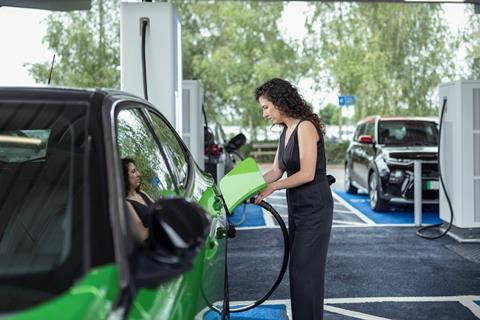
Drivers need incentives to choose EVs over petrol or diesel vehicles to reverse falling demand, says the Society of Motor Manufacturers and Traders (SMMT).
The call came as the SMMT released data showing that the UK new car market grew 21% in September with 272,610 registrations.
Electrified vehicle uptake continued to grow in September, with plug-in hybrid vehicles (PHEVs) up 50.9% to take a 6.8% market share and hybrid electric vehicles (HEVs) up 30.7% to account for 13.9% of all registrations. Battery electric vehicles (BEVs), meanwhile, recorded their 41st consecutive month of growth – with 45,323 drivers making the switch, an 18.9% uplift. Given this growth was less than the overall recorded by the market, however, BEV market share slipped back slightly to 16.6% from 16.9% a year ago.
BEV volume increases were driven entirely by fleet purchases, which rose by 50.6% as buyers were drawn to the “compelling tax incentives”. Conversely, private BEV registrations fell -14.3% with less than one in 10 private new car buyers opting for electric during the month. The SMMT said such a decline underlines the importance of providing motorists with purchase incentives and other mechanisms to stimulate demand.
Mike Hawes, SMMT chief executive, said: “A bumper September means the new car market remains strong despite economic challenges. However, with tougher EV targets for manufacturers coming into force next year, we need to accelerate the transition, encouraging all motorists to make the switch. This means adding carrots to the stick – creating private purchase incentives aligned with business benefits, equalising on-street charging VAT with off-street domestic rates and mandating chargepoint rollout in line with how electric vehicle sales are now to be dictated. The forthcoming Autumn Statement is the perfect opportunity to create the conditions that will deliver the zero emission mobility essential to our shared net zero ambition.”
Despite an end-of-sale date now aligned with other major markets, Hawes said the UK still has the most challenging zero emission vehicle (ZEV) transition timeline. The recently published Zero Emission Vehicle Mandate requires ZEVs to comprise half of each manufacturer’s new registrations within five years, and 80% by 2030. “Achieving this will depend on private buyers making the transition, along with business and fleet customers. However, unlike in the other major markets working towards a 2035 end of sale date, UK private motorists have no purchase incentive to encourage them to invest in electric mobility,” he said.
































